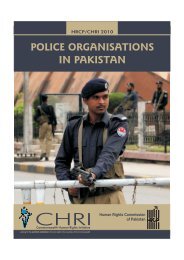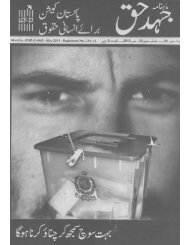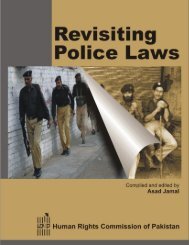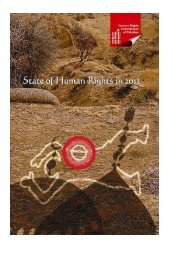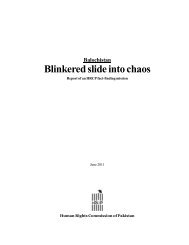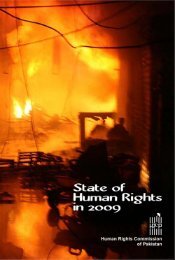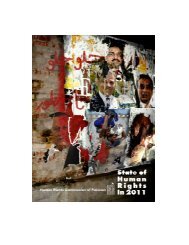Judical Action to end Bonded Labour - Human Rights Commission ...
Judical Action to end Bonded Labour - Human Rights Commission ...
Judical Action to end Bonded Labour - Human Rights Commission ...
You also want an ePaper? Increase the reach of your titles
YUMPU automatically turns print PDFs into web optimized ePapers that Google loves.
(1) WAGES:<br />
Before making my proposals, I would place before this Hon'ble Court the<br />
problems which I have visualised during all these days:<br />
The question of wages is a pivotal issue. The illiterate and landless classes of the rural<br />
society, having no other job <strong>to</strong> meet their daily life requirements, come <strong>to</strong> Bhatta owners.<br />
They come in a family unit. The admitted wages till <strong>to</strong>day paid <strong>to</strong> labour are Rs.35 <strong>to</strong> Rs.40<br />
for 1,000 bricks which, according <strong>to</strong> the bhatta owners, will be raised <strong>to</strong> Rs.50 per thousand<br />
bricks in future. The estimated cost of production of 1,000 bricks comes <strong>to</strong> Rs.220 <strong>to</strong>; Rs.230<br />
and the sale price <strong>to</strong>day is about Rs.650 <strong>to</strong> Rs.700 per thousand. The profit seems <strong>to</strong> be<br />
enormous. The labour force when calculated on daily basis, by producing 1,000 bricks per<br />
day, gets maximum Rs.5 per day. After adjustment of advance, etc. their take-home is not<br />
more than Rs.2.50 a day. This is highly unjust. There should be some relationship between<br />
the profit and the wages oil the labour. This kind of wages even do not work as subsistence<br />
allowances for the labour force.<br />
(2) ADVANCE SYSTEM:<br />
The advance system working within the labour force of bhattas is certainly a cruel and<br />
vicious circle. As submitted above, in most of the cases, the first advance is the money which<br />
is paid by their new owner <strong>to</strong> their last owner, This money liability is in many cases inherited.<br />
The increase in the advance is not necessarily made by actual payment. The system of fine<br />
in case of non-payment within the directed time by the owner fattens the advances. The few<br />
pho<strong>to</strong> copies of the documents evidencing this position are attached with this report. The<br />
only cure <strong>to</strong> this seems <strong>to</strong> be the abolition of advance system al<strong>to</strong>gether and the payment of<br />
wages <strong>to</strong> the labour force on daily basis <strong>to</strong> be fixed under the Minimum Wages Act.<br />
(3) LACK OF MEDICAL FACILITIES & EDUCATION:<br />
(i) In order <strong>to</strong> provide the medical facilities and the facilities of education <strong>to</strong> the children<br />
of the labour, the application of Fac<strong>to</strong>ries Act in letter and spirit <strong>to</strong> the brick-kiln<br />
industry may help a lot <strong>to</strong> solve this problem.<br />
(ii) Out of the numerous problems, noted above, there is one, the most important<br />
deserving reference i.e. the counting of the bricks after their making. At most of the<br />
bhattas, instead of 1,000 bricks, the owner will receive 1,020 bricks in katcha shape<br />
<strong>to</strong> account for any loss or damage likely <strong>to</strong> occur during transportation <strong>to</strong> the kiln. The<br />
loss/damage <strong>to</strong> the bricks by rains, etc. is shared by the labour by 50%. This again is<br />
unjustified. It may be mentioned here that in the brick-kiln industry, there are five<br />
kinds of labour force which is detailed below:-<br />
(a) Those who make the bricks are named as PATHAIRAS.<br />
(b) Those who transport katcha bricks <strong>to</strong> brick-kiln are known as KUMHARS,<br />
(c) Those who stack the bricks in the kiln are known as BHARAI WALAS,<br />
(d) Those who bake the bricks by giving coal, etc. are known as JALAI WALAS,<br />
and ;<br />
(e) Those who, after the baking of the bricks, take them out are known as NIKASI<br />
WALAS.<br />
All the above categories are almost facing the same problems.<br />
(4) LEGISLATIVE MEASURES:<br />
The Constitution of Pakistan in its Articles No.11, 14(1), 15,18, 24, 35, 36 and 37 has<br />
attempted <strong>to</strong> look after the situation. In P.P.C, sections 367, 368, 370,371 and 374 have<br />
provided punishment in case of violation of the rights noted above. This is not enough. The<br />
--- 35 ---



